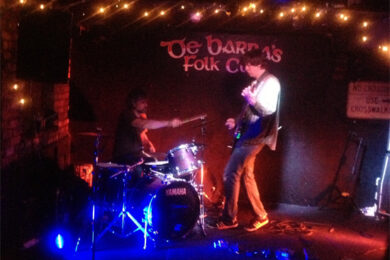"Life gives us something to live for," the poem goes. "We will do whatever it takes to make it last."
A tall man, clad in green flannel shirt, faded jeans and black Adidas trainers takes to the tiny stage of DeBarra’s Folk Club in Clonakilty to line up his effects pedals. Roadie to himself, he shuffles on without fanfare, plugs in, switches on, and goes. The bearded guy on drums to his right, who a short time earlier was selling discs at the door, is drummer John Moloney, formerly of Sunburned Hand Of The Man (among others). And the guitarist is… well, according to the blurb for this lowest of low-key gigs, Thurston Moore is "the self-taught Connecticut guitarist with the Coachmen, Male Slut, Dapper, Wylde Ratttz, Dim Stars, Northampton Wools, Bark Haze, Pillow Wand, Diskaholics Anonymous, Society’s Ills, The Dream Aktion Unit and several other combos." See if you can guess one of the others.
DeBarra’s, a famed folk and rock venue that for decades was the musical residence of Hendrix Experience bassist Noel Redding, has given a gentle, awed welcome to the man who for many is Sonic Youth. Tonight there is just one modest drum kit and one guitar, and a band called Caught on Tape, the two-piece of Moore and Moloney whose improvisations echo the former’s mainstay group. He may be his own guitar tech, but his guitar strap has his name written down it: Thurston. You can’t ignore the star power, however much he tries to deflect it.
They play one long piece, lasting just short of half an hour, and the first strings begin to snap from the wood about 25 minutes in. They’ve done well to last that long, given they’re skewered with an iron bar from the first notes, plucked with the fingers like some miniature harp. They’re later assailed with the screwdriver, and pushed and pulled in various directions. Moloney’s drumming for the most part follows the sound, but on some occasions he forces the issue, and drags Moore’s playing back into brutally blunt riffing, for which the fewer strings, the better.
This is an exercise in performance, of manipulating electronics and pushing sound currents around a limited space for maximum impact. At one point Moore holds the guitar upright, close to his chest, and staggers into the back wall as though pushed there by the feedback blaring out in all directions. Think Angus Young on the cover of AC/DC’s If You Want Blood, impaled on his guitar. Seconds later he’s shuffling forward, holding the instrument in a way that brings to mind news footage from some far-off land, stock visuals of a father carrying his prone child after some bomb atrocity. Then seconds later he’s back in familiar pose, one foot ahead of the other, his ‘stupid mop’ still dangling into his eyes and blowing away the years, all the mileage that’s come before and that has led him here…
Watching in the dark, a few questions come to mind. Is this new, or relevant? The answer is both yes and no. Moore’s recent solo material has reams of tunefulness, so in many ways this is a return to the no wave sound experiments of Sonic Youth’s early days. Each amplifier groan, each bent note – they’ve probably been played before, but it still sounds coherent, and what’s more, he is evidently enjoying himself. Maybe this is simply a working holiday, a way of seeing some more of the world without the logistics of carting dozens of those alternatively tuned guitars around, a slimmed-down version of the way it used to be at the beginning. Who knows? Who cares?
In the somewhat bumbling interlude following the main piece and before some shorter sound experiments, Thurston – alt-rock deity, eternally youthful noise poster boy – asks those in the small crowd if they want to read some poems. When there’s no takers, he extols the virtues of Irish poet Dennis O’Driscoll, who died last month, and offers the chance of a Q&A, except everyone is too shy. "I feel like I should say something," he mumbles, before then explaining that being here, in west Cork, at this time, feels just right, as this part of the world is Capricorn-friendly and someone important to him is celebrating a birthday the next day and he wants to buy her a freshly-baked cake. It all feels a little awkward, but not in a bad way. He handles the awed, shuffling silence because around it all there seems to be a sense of fun and quiet adventure.
It’s all wrapped up minutes later when he uses his iPhone stopwatch to play short bursts of noise in units of 30 seconds, 15 seconds, 5 seconds and then 1. It takes three attempts to bring the one second sound blast in on time, but no matter: both men are draped in smiles through the effort. It brings to mind a few lines from O’Driscoll, the man from Tipperary, the very next county over, who very few in the crowd seemed to have heard of or read – "Life gives us something to live for: we will do whatever it take to make it last." Maybe this is what this performance and this tour is about – a way of keeping on during the uncertainty of middle age, of a band that has become an institution, that has aged with style and verve but aged nonetheless. "We would give a right hand to prolong it," this particular poem goes. "Cannot imagine living without it."



